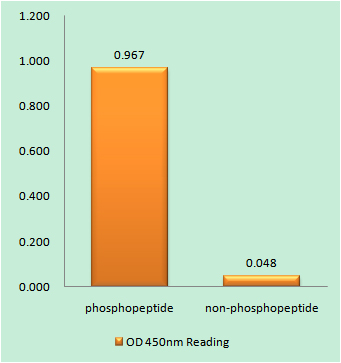p47-phox (phospho Ser328) Polyclonal Antibody
- Catalog No.:YP1018
- Applications:WB;IHC;IF;ELISA
- Reactivity:Human;Mouse;Rat;Cow
- Target:
- p47-phox
- Fields:
- >>Chemokine signaling pathway;>>Phagosome;>>Osteoclast differentiation;>>Neutrophil extracellular trap formation;>>Fc gamma R-mediated phagocytosis;>>Leukocyte transendothelial migration;>>Prion disease;>>Leishmaniasis;>>Chemical carcinogenesis - reactive oxygen species;>>Diabetic cardiomyopathy;>>Lipid and atherosclerosis;>>Fluid shear stress and atherosclerosis
- Gene Name:
- NCF1
- Protein Name:
- Neutrophil cytosol factor 1
- Human Gene Id:
- 653361
- Human Swiss Prot No:
- P14598
- Mouse Gene Id:
- 17969
- Mouse Swiss Prot No:
- Q09014
- Immunogen:
- The antiserum was produced against synthesized peptide derived from human Neutrophil Cytosol Factor 1 around the phosphorylation site of Ser328. AA range:301-350
- Specificity:
- Phospho-p47-phox (S328) Polyclonal Antibody detects endogenous levels of p47-phox protein only when phosphorylated at S328.
- Formulation:
- Liquid in PBS containing 50% glycerol, 0.5% BSA and 0.02% sodium azide.
- Source:
- Polyclonal, Rabbit,IgG
- Dilution:
- WB 1:500-2000 IHC 1:100 - 1:300. ELISA: 1:10000. IF 1:50-200
- Purification:
- The antibody was affinity-purified from rabbit antiserum by affinity-chromatography using epitope-specific immunogen.
- Concentration:
- 1 mg/ml
- Storage Stability:
- -15°C to -25°C/1 year(Do not lower than -25°C)
- Other Name:
- NCF1;NOXO2;SH3PXD1A;Neutrophil cytosol factor 1;NCF-1;47 kDa autosomal chronic granulomatous disease protein;47 kDa neutrophil oxidase factor;NCF-47K;Neutrophil NADPH oxidase factor 1;Nox organizer 2;Nox-organizing protein 2;SH3
- Molecular Weight(Da):
- 45kD
- Background:
- The protein encoded by this gene is a 47 kDa cytosolic subunit of neutrophil NADPH oxidase. This oxidase is a multicomponent enzyme that is activated to produce superoxide anion. Mutations in this gene have been associated with chronic granulomatous disease. [provided by RefSeq, Jul 2008],
- Function:
- disease:Defects in NCF1 are the cause of chronic granulomatous disease autosomal recessive cytochrome-b-positive type 1 (CGD1) [MIM:233700]. Chronic granulomatous disease is a genetically heterogeneous disorder characterized by the inability of neutrophils and phagocytes to kill microbes that they have ingested. Patients suffer from life-threatening bacterial/fungal infections.,function:NCF2, NCF1, and a membrane bound cytochrome b558 are required for activation of the latent NADPH oxidase (necessary for superoxide production).,online information:NCF1 deficiency database,similarity:Contains 1 PX (phox homology) domain.,similarity:Contains 2 SH3 domains.,subunit:Interacts with NOXA1.,
- Subcellular Location:
- Cytoplasm, cytosol . Membrane ; Peripheral membrane protein ; Cytoplasmic side .
- Expression:
- Detected in peripheral blood monocytes and neutrophils (at protein level).
Free fatty acids promote degranulation of azurophil granules in neutrophils by inducing production of NADPH oxidase-derived reactive oxygen species in cows with subclinical ketosis J Dairy Sci. 2022 Jan;:. WB Cow 1:1000
β-Hydroxybutyrate impairs the release of bovine neutrophil extracellular traps through inhibiting phosphoinositide 3-kinase–mediated nicotinamide adenine dinucleotide phosphate oxidase reactive oxygen species production J Dairy Sci. 2022 Feb;:. WB Bovine 1:1000
- June 19-2018
- WESTERN IMMUNOBLOTTING PROTOCOL
- June 19-2018
- IMMUNOHISTOCHEMISTRY-PARAFFIN PROTOCOL
- June 19-2018
- IMMUNOFLUORESCENCE PROTOCOL
- September 08-2020
- FLOW-CYTOMEYRT-PROTOCOL
- May 20-2022
- Cell-Based ELISA│解您多样本WB检测之困扰
- July 13-2018
- CELL-BASED-ELISA-PROTOCOL-FOR-ACETYL-PROTEIN
- July 13-2018
- CELL-BASED-ELISA-PROTOCOL-FOR-PHOSPHO-PROTEIN
- July 13-2018
- Antibody-FAQs
- Products Images

- Enzyme-Linked Immunosorbent Assay (Phospho-ELISA) for Immunogen Phosphopeptide (Phospho-left) and Non-Phosphopeptide (Phospho-right), using Neutrophil Cytosol Factor 1 (Phospho-Ser328) Antibody

- Immunohistochemistry analysis of paraffin-embedded human tonsil, using Neutrophil Cytosol Factor 1 (Phospho-Ser328) Antibody. The picture on the right is blocked with the phospho peptide.



